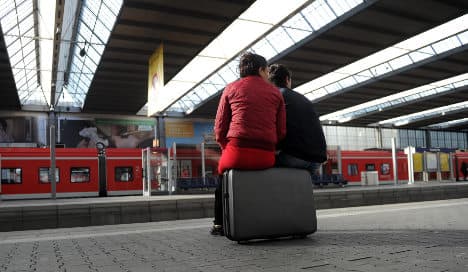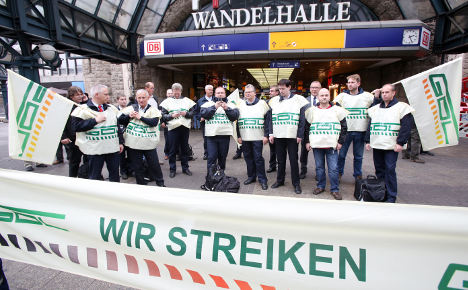Train drivers begin record 98-hour rail strike

UPDATE: Chancellor Angela Merkel on Wednesday urged the train drivers' union and rail operator Deutsche Bahn to find a compromise in an industrial dispute which has led to the start of a four-day strike.
Speaking on Wednesday, Merkel appealed to both sides to find a resolution to the dispute.
"Strikes are always a possibility in wage negotiations but they should be proportional," she said, adding that a solution should be found which does the least possible damage to the country.
The chancellor appealed to the "sense of responsibility" of all parties in the row. She spoke just before freight train drivers started their walkout at 3pm on Wednesday.
Passenger rail drivers will follow suit at 2am on Thursday and not return to work until Monday.
Deutsche Bahn (DB) is also looking to the courts to check the legality of the strike, hoping the action could be deemed illegal.
But passengers should still expect the 98-hour walkout to go ahead. “Our experience with labour courts is that they don't easily agree with such requests when they're asked to judge on proportionality,” DB human resources director Ulrich Weber told Deutschlandfunk.
DB announced on Tuesday evening that around a third of trains would run to an emergency timetable it is drawing up. Details have been released on the DB website (in German).
All intercity, regional and S-Bahn trains will be hit and disruption to passenger services is likely to begin on Wednesday afternoon, hours before the official beginning of the walkout, which was announced on Tuesday by train drivers' union, the GDL.
One way to get around the strikes is on coaches, but services are filling up fast and some coach companies have more than doubled their prices for this weekend.
SEE ALSO: Ten best ways to get around without trains
'Damaging all unions'
Germans woke up on Wednesday morning with little sympathy for the GDL which wants a five-percent pay rise, a two-hour cut to the working week and the right to represent more rail workers.
Spiegel Online called the union's struggle for the right to represent a larger share of Deutsche Bahn's workers “the least likeable labour battle in Germany”.
“If trains are sometimes cancelled because the drivers want better pay, it's not a problem,” it argued. “People understand because they understand what the strike's about.”
GDL leader Claus Weselsky's power struggle with rival union EVG doesn't resonate with the public in the same way, Spiegel argued. “No-one wants to delay their trip over a scrap about representation between competing unions."
Unfortunately, according to Spiegel, there is “no middle ground” in the current contest – either Weselsky will get everything he wants or nothing.

Strikes were a fundamental part of wage bargaining, Transport Minister Alexander Dobrindt told Bild on Wednesday, but unions should take care “to make the impact on uninvolved third parties as limited as possible."
“With these repeated walkouts the GDL is damaging all unions,” Social Democratic Party (SPD) General Secretary Yasmin Fahimi told Spiegel.
Christian Social Union (CSU) politician Peter Ramsauer, head of the Bundestag's Economy Committee, said that “small splinter unions are taking the economy and society hostage over wage negotiations more and more unscrupulously.”
“Every strike day costs [GDL] public sympathy,” the Frankfurter Allgemeine Zeitung said.
“The longer the walkout, the greater the political support for [Labour Minister Andrea] Nahles' law,” referring to a draft law that would restrict negotiating power to the largest union in a business.
A moderator with “very strong psychological skills” is now needed to end the conflict, passengers' association Pro Bahn spokesman Gerd Aschoff told Deutschlandfunk.
The “brawlers” at the GDL wouldn't be able to come to an agreement unaided, he suggested.
Berliner Morgenpost editorial writers were particularly offended by the choice of dates.
“This was supposed to be a weekend of the world looking once more to Berlin and seeing a world city,” they wrote, noting that two million people were expected to visit the capital.
The timing “makes the strike an affront – that's the only way to describe it,” they said.
SEE ALSO: Meet the man stopping Germany's trains
Comments
See Also
Speaking on Wednesday, Merkel appealed to both sides to find a resolution to the dispute.
"Strikes are always a possibility in wage negotiations but they should be proportional," she said, adding that a solution should be found which does the least possible damage to the country.
The chancellor appealed to the "sense of responsibility" of all parties in the row. She spoke just before freight train drivers started their walkout at 3pm on Wednesday.
Passenger rail drivers will follow suit at 2am on Thursday and not return to work until Monday.
Deutsche Bahn (DB) is also looking to the courts to check the legality of the strike, hoping the action could be deemed illegal.
But passengers should still expect the 98-hour walkout to go ahead. “Our experience with labour courts is that they don't easily agree with such requests when they're asked to judge on proportionality,” DB human resources director Ulrich Weber told Deutschlandfunk.
DB announced on Tuesday evening that around a third of trains would run to an emergency timetable it is drawing up. Details have been released on the DB website (in German).
All intercity, regional and S-Bahn trains will be hit and disruption to passenger services is likely to begin on Wednesday afternoon, hours before the official beginning of the walkout, which was announced on Tuesday by train drivers' union, the GDL.
One way to get around the strikes is on coaches, but services are filling up fast and some coach companies have more than doubled their prices for this weekend.
SEE ALSO: Ten best ways to get around without trains
'Damaging all unions'
Germans woke up on Wednesday morning with little sympathy for the GDL which wants a five-percent pay rise, a two-hour cut to the working week and the right to represent more rail workers.
Spiegel Online called the union's struggle for the right to represent a larger share of Deutsche Bahn's workers “the least likeable labour battle in Germany”.
“If trains are sometimes cancelled because the drivers want better pay, it's not a problem,” it argued. “People understand because they understand what the strike's about.”
GDL leader Claus Weselsky's power struggle with rival union EVG doesn't resonate with the public in the same way, Spiegel argued. “No-one wants to delay their trip over a scrap about representation between competing unions."
Unfortunately, according to Spiegel, there is “no middle ground” in the current contest – either Weselsky will get everything he wants or nothing.

Strikes were a fundamental part of wage bargaining, Transport Minister Alexander Dobrindt told Bild on Wednesday, but unions should take care “to make the impact on uninvolved third parties as limited as possible."
“With these repeated walkouts the GDL is damaging all unions,” Social Democratic Party (SPD) General Secretary Yasmin Fahimi told Spiegel.
Christian Social Union (CSU) politician Peter Ramsauer, head of the Bundestag's Economy Committee, said that “small splinter unions are taking the economy and society hostage over wage negotiations more and more unscrupulously.”
“Every strike day costs [GDL] public sympathy,” the Frankfurter Allgemeine Zeitung said.
“The longer the walkout, the greater the political support for [Labour Minister Andrea] Nahles' law,” referring to a draft law that would restrict negotiating power to the largest union in a business.
A moderator with “very strong psychological skills” is now needed to end the conflict, passengers' association Pro Bahn spokesman Gerd Aschoff told Deutschlandfunk.
The “brawlers” at the GDL wouldn't be able to come to an agreement unaided, he suggested.
Berliner Morgenpost editorial writers were particularly offended by the choice of dates.
“This was supposed to be a weekend of the world looking once more to Berlin and seeing a world city,” they wrote, noting that two million people were expected to visit the capital.
The timing “makes the strike an affront – that's the only way to describe it,” they said.
SEE ALSO: Meet the man stopping Germany's trains

Join the conversation in our comments section below. Share your own views and experience and if you have a question or suggestion for our journalists then email us at [email protected].
Please keep comments civil, constructive and on topic – and make sure to read our terms of use before getting involved.
Please log in here to leave a comment.